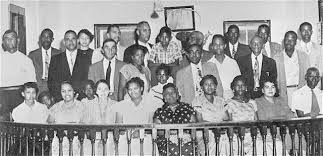Briggs et al. v. Elliott et al. (Briggs v. Elliott; Briggs) was a lawsuit filed in 1951 by 20 plaintiffs. It claimed that enforced racial segregation laws violated the equal protection guaranteed by the 14th Amendment to the US Constitution. The plaintiffs were parents of students in School District No. 22 of Summerton (Clarendon County), South Carolina, while the defendants were the seven officials in charge of the district’s schools.
Although Briggs was filed as a challenge to segregation, it arose from previous unsuccessful efforts for improved educational facilities for black children. Initially, a lawsuit was filed in November 1950 by School District 22 parents for equalization of educational opportunities. During the pretrial hearing, Judge J. Waties Waring made a cogent observation concerning that the plaintiffs were seeking a right they already had under South Carolina law. The outcome would most likely be a ruling in the plaintiffs’ favor—however, it would also result in the reaffirmation of “separate but equal” doctrine. The case was withdrawn. A petition was drafted and filed in federal court as Briggs et al. v. Elliott et al. It sought both a declaration that South Carolina’s laws relating to public school segregation violated the 14th Amendment and correction of the unequal opportunities.
Briggs was argued before a three-judge federal court in May 1951. The split verdict, issued in June 1951, denied the plaintiffs’ claim. Judge Waring filed a scathing dissenting opinion. In December 1952, appeals of Briggs and four other public school segregation cases were heard individually by the US Supreme Court. A collective decision—now known as Brown v. Board—unanimously found that segregation in public schools is “inherently unequal” and deprives citizens of the equal protections guaranteed by the 14th and 5th Amendments. The announcement was made on 17 May 1954.
In May 1955, Briggs was remanded to the District Court with the charge of overseeing orders and decrees consistent with the Supreme Court’s opinion and proper to admit the parties to these cases to public schools on a racially nondiscriminatory basis with all deliberate speed.
